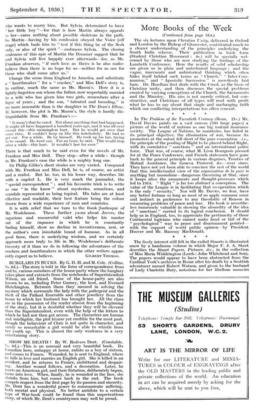In The Problent of the Twentieth Century (Benn, 21s.) Mr.
David Davies paints on a vast canvas (700 large pages) a picture of the world of nations as one big mutual insurance society. The League of Nations, he maintains, has failed in its principal objective, the elimination of war, because its promoters at the outset fell short of the pure conception—i.e., the principle of the pooling of Might to be placed behind Right, with its correlative " sanctions" and an international police force. That was, of course, what M. Leon Bourgeois pressed for at the Peace Conference, and French statesmen have gone back to the general principle in various disguises, Treaties of Mutual Assistance, the Geneva Protocol, &c.—ever since.• They have not yet been able to convince the rest of the world that this intellectualist view of the organisation de la paix is anything but moonshine—dangerous theorizing at that, since it keeps alive the armaments and thought-processes which led to 1914. " Right " is far too abstract a conception. The' value of the League is in facilitating that co-operation which is the only "security." Nor will Mr. Davies, we fear, have any better fortune so long as most of us apply common sense and instinct in preference to any theodolite of Reason in measuring problems of peace and war. His book is neverthe- less immensely valuable in showing the absurdity of the idea of " sanctions ' carried to its logical conclusion. It should help us in England, too, to appreciate the pertinacity of those Continental logicians who cannot make head or tail of the " psychological " way to peace and disarmament pointed— with the support of world public opinion—by President Hoover and Mr. Ramsay MacDonald.
* * * *






























 Previous page
Previous page